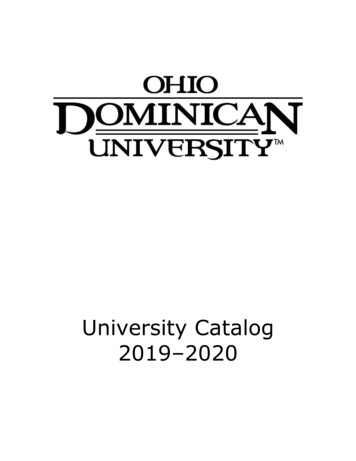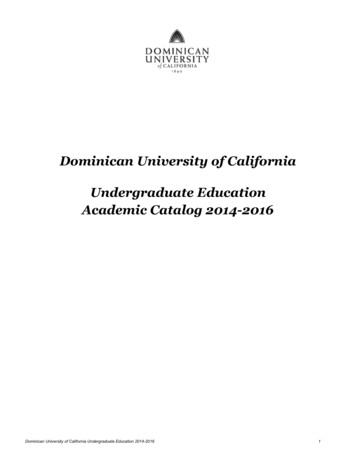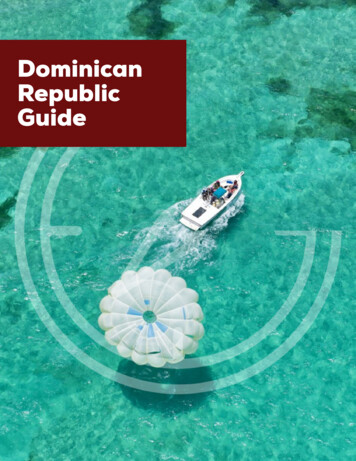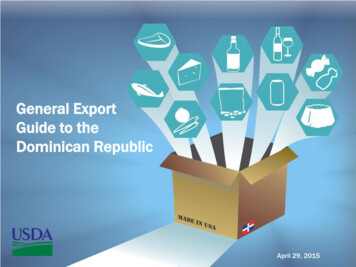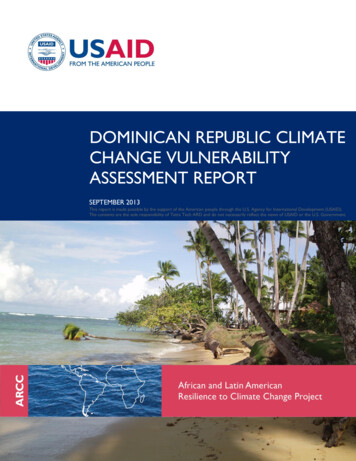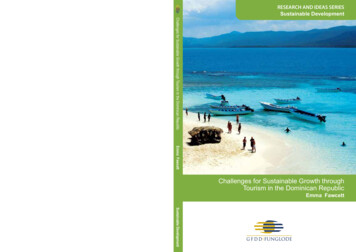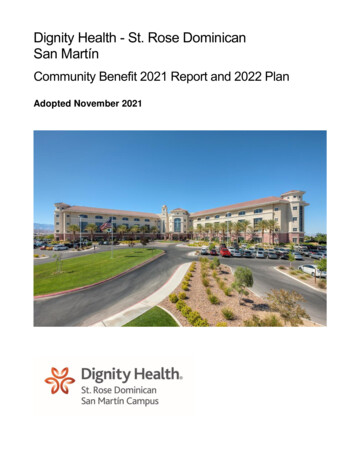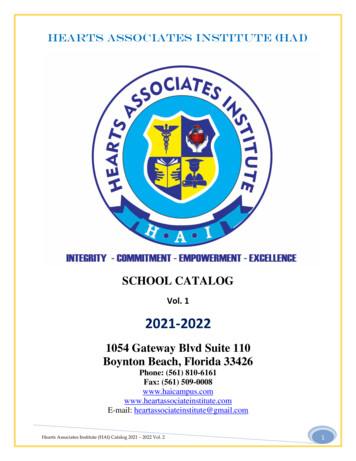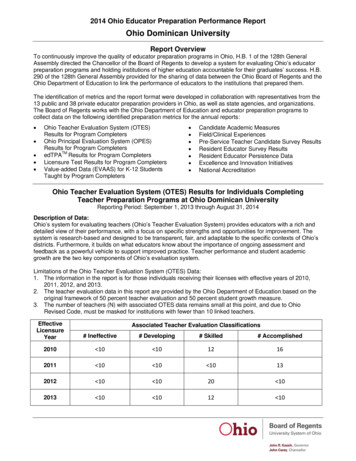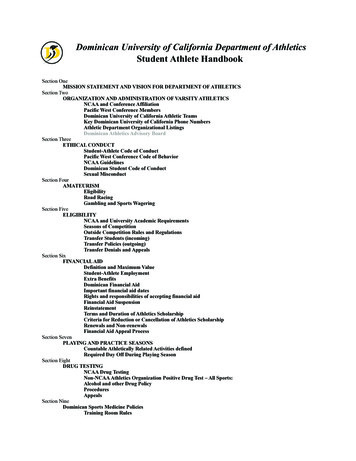
Transcription
Dominican University of California Department of AthleticsStudent Athlete HandbookSection OneMISSION STATEMENT AND VISION FOR DEPARTMENT OF ATHLETICSSection TwoORGANIZATION AND ADMINISTRATION OF VARSITY ATHLETICSNCAA and Conference AffiliationPacific West Conference MembersDominican University of California Athletic TeamsKey Dominican University of California Phone NumbersAthletic Department Organizational ListingsDominican Athletics Advisory BoardSection ThreeETHICAL CONDUCTStudent-Athlete Code of ConductPacific West Conference Code of BehaviorNCAA GuidelinesDominican Student Code of ConductSexual MisconductSection FourAMATEURISMEligibilityRoad RacingGambling and Sports WageringSection FiveELIGIBILITYNCAA and University Academic RequirementsSeasons of CompetitionOutside Competition Rules and RegulationsTransfer Students (incoming)Transfer Policies (outgoing)Transfer Denials and AppealsSection SixFINANCIAL AIDDefinition and Maximum ValueStudent-Athlete EmploymentExtra BenefitsDominican Financial AidImportant financial aid datesRights and responsibilities of accepting financial aidFinancial Aid SuspensionReinstatementTerms and Duration of Athletics ScholarshipCriteria for Reduction or Cancellation of Athletics ScholarshipRenewals and Non-renewalsFinancial Aid Appeal ProcessSection SevenPLAYING AND PRACTICE SEASONSCountable Athletically Related Activities definedRequired Day Off During Playing SeasonSection EightDRUG TESTINGNCAA Drug TestingNon-NCAA Athletics Organization Positive Drug Test – All Sports:Alcohol and other Drug PolicyProceduresAppealsSection NineDominican Sports Medicine PoliciesTraining Room Rules
General Rules and Guidelines for the Training RoomInjury ReportingInjury ReportsInjury InformationPhysicals for Incoming and Returning Student AthletesQualifications to PlayMedical ExpensesInsuranceFrequently Asked Questions (FAQs)Section TenACADEMIC ASSISTANCEAcademic MonitoringTutoring ServicesAcademic Advising and Support ServicesMissed class PolicyAcademic CalendarFall Semester 2009Spring Semester 2010Section ElevenEQUIPMENT ROOM POLICYResponsibilityEquipment IssueEquipment ReplacementEquipment CollectionEquipment Room UseEquipment UseSection TwelvePROGRAM EVALUATIONPolicyProcedureSection ThirteenSTUDENT WELFAREStudent-Athlete Advisory Committee (SAAC)Social Networking Websites PolicySection FourteenRECRUITMENTOffersContactsPublicityLetter of Intent SigningTryoutsVisits, Transportation and EntertainmentPre-college or Postgraduate ExpensesSection FifteenMedia Relations
MISSION STATEMENT AND PHILOSOPHY OF VARSITY ATHLETICS:SECTION I:MISSION STATEMENT AND PHILOSOPHY OF VARSITY ATHLETICS:Dominican Athletics Mission StatementDominican Athletics is dedicated to supporting academic and athletic excellence though continuouslearning, leadership, and service. We build esprit de corps on campus and within the greater communityby embracing diversity; promoting balance in life; and respecting the dignity and worth of the individual.Dominican Athletics Vision StatementDominican is an academic leader in NCAA Division II athletics, mentoring a diverse student body thatexcels in scholarship. Strongly supported by the greater bay area community, Dominican is a topuniversity of choice for Division II athletes, consistently competing athletically for conferencechampionships and national prominence. Our student athletes are ambassadors for the university and arewell recognized for sportsmanship, leadership and integrity.SECTION II:Organization and Administration of Varsity AthleticsNCAA and Conference Affiliation:The NCAA is the primary association that governs and controls intercollegiate athletics on the nationallevel. Dominican University of California athletics program is taking the next step towards becoming afull-fledged member of NCAA Division II by successfully completing its first year of candidacy formembership. With the first year completed, the university has been granted acceptance into year twocandidacy by the Division II Membership Committee. Year two candidacy becomes effective September1, 2009.Dominican was admitted to the Pacific West Conference under exploratory status in 2008-09 andcompeted in an independent schedule that reflected the program’s previous association with NAIADivision II. Dominican will become the ninth member of the PacWest for the 2009-2010 season.Pacific West Conference MembersAcademy of Art UniversityBrigham Young University, Hawai‘iChaminade UniversityDixie State CollegeGrand Canyon UniversityUniversity of Hawai‘i at HiloHawai‘i Pacific UniversityNotre Dame de Namur University
Dominican University of California Athletic lGolfSoccerSoftballTennisVolleyballKey Dominican University of California Phone NumbersDepartment of AthleticsAthletics FaxSports Information / Media Relations OfficeDominican Main SwitchboardCampus SecurityEmergency (from any on-campus phone)Admissions OfficeAcademic AdvisingFinancial etic Department Organizational ListAthletic AdministrationDirector of Athletics415-482-3504Manager, Athletic Administration415-485-3219Terry Tumeyterry.tumey@dominican.eDominicanPatrick Huserpatrick.huser@dominican.eDominicanDr. Chris Leedscleeds@dominican.eDominicanMarla Reidmarla.reid@dominican.eDominicanFAR & ComplianceFaculty Athletic Representative415-482-3532Compliance Coordinator415-482-3563Sports Information/Media RelationsSports Information DirectorBrandon Davisbrandon.davis@dominican.eDominican 415-482-3526Jesse Mazzajmazza@dominican.eDominicanAthletic TrainingHead Athletic Trainer415-257-1353Coaching StaffHead Coach, Women’s BasketballBrianna Chambers415-482-3506Director of SoccerJon Delano415-482-3511Head Coach, VolleyballRoger Goodwin415-257-1304Head Coach, SoftballBob Herman415-257-1306Head Coach, Women’s & Men’s Golf John Murrayjohn.murray@dominican.eDominicanHead Coach, Women’s TennisMarla 15-482-3564marla.reid@dominican.eDominican
Head Coach, Men’s BasketballBret Tovani415-458-3758Head Coach, Lacrosse/Mgr, Intramural Ned Webster415-482-3512Emergency NumbersSecurity:San Rafael Fire:Police Department (Emergency Only)Sheriff’s 24-Hour DispatchMarin General HospitalKaiser Terra Linda 485-3393415-499-7233415-925-7000415-444-2400
SECTION III:ETHICAL CONDUCTStudent-Athlete Code of ConductAthletics at Dominican University of California is an integral part of the school’s total education program.All school activities, curricular and extra-curricular, in the classroom and on the playing field, must beconsistent with the University’s stated goals and objectives established for the intellectual, physical, socialand moral development of its students.As a student athlete at Dominican University of California, you are expected to: Place academic achievement as the highest priorityShow respect for teammates, opponents, officials, and coaches.Exhibit fair play, sportsmanship, and proper conduct on and of the playing field.Maintain a high level of safety awareness.Refrain from the use profanity, vulgarity, and other offensive language and gestures.Adhere to the established rules, standard and policies set forth by the Department of Athletics andRecreation, and the team rules and policies established by your Head Coach.Respect all facilities and equipment and use it safely and appropriately.Refrain from the use of alcohol, tobacco, illegal and non-prescription drugs, anabolic steroids, orany substance that enhances physical development or performance that is not approved by theUnited States Food and Drug Administration, Surgeon General of the United States, or AmericanMedical Association.Know and follow all NCAA, university and team rules and regulations as they pertain toeligibility and sports participation. Reference eligibility sections for more information.Pacific West Conference Code of ConductAs stated in the Pacific West Conference Bylaws, Article 11, Section 1:A. It shall be the responsibility of each institution to ensure that all individuals employed by or directly associated with theathletic programs of that institution conduct themselves in a sportsmanlike manner when representing their institution, especiallyat intercollegiate athletic contests.B. Unsportsmanlike conduct shall subject the individual to disciplinary action. The institution with which the offendingindividual is associated may also be subject to disciplinary action if it is found that the institution's policies, action, or failure toact substantially contributed to the individual's misconduct.C. Acts of Unsportsmanlike Conduct and Individual Penalties.Acts of unsportsmanlike conduct shall include, but not be limited to: any player who strikes or physically abuses an official,opposing coach or player. This person may be ejected from the contest and, in the event of a flagrant violation, may be suspendedfor additional contests as the Commissioner deems appropriate.The following actions shall be subject to a public reprimand for the first offense and a suspension for one contest for anadditional offense (a flagrant offense is subject to suspension on the first offense):1.Intentionally inciting participants or spectators to violent or abusive action.2.Using obscene gestures of profane or unduly provocative language or action toward officials, opponents, or spectators.3.Publicly criticizing any game official, Conference personnel, another institution or its personnel.4.Acts of unsportsmanlike conduct not specifically described herein.Any person who engages in negative recruiting by making statements to a prospective student-athlete, his/her parents, highschool coach, or other persons interested in the prospective athlete which are unduly derogatory of another member institution, itspersonnel, or its athletic program be subject to a public reprimand for the first offense, and to the suspension of the privilege ofrecruiting for one season for an additional offense.
D. Penalty Imposition and Appeal Procedures.1.Whenever the Commissioner concludes that there has been a violation of this regulation, he/ shall impose the penaltyprescribed above or, where he/she is given discretion as to penalty, he/she shall impose a penalty which he/she deems appropriate.2.Whenever the Commissioner decides to impose a penalty, he/she shall first give notice of the decision to the individual andthe institution involved.3.In the event that the individual or the institution feels that the penalty is inappropriate because the violation did not occuror because the penalty is excessive, there shall be the right to appeal the matter to a Compliance Committee. The appeal may betaken by giving the Commissioner notice within five (5) days of receipt of notice of the penalty imposed by him/her.4.The Compliance Committee shall be appointed by the Conference president from among the institutional representativeswhose institutions are not involved in the complaint. The Committee shall conduct a prompt hearing, giving the individual orinstitution opportunity to be heard. The Committee may reaffirm, set aside, or increase the penalty as is deemed appropriate,giving the individual or institution written notice of its decision and its reasons.5.The penalty imposed by the Commissioner shall be stayed pending the decision by the Compliance Committee. No publicannouncement of the penalty shall be made until the individual or institution fails to give notice of the desire to appeal within thefive-day period.6.Nothing herein shall prevent the Commissioner from taking appropriate interim action.7.Whenever a penalty of suspension is imposed at or near the end of a season of competition, the penalty may be carriedover into the next season of competition.8.Definition of terms used in this bylaw. Suspension in the case of a player means that the player cannot participate in the designated number of contests butmay practice. In the case of a coach, suspension means that the coach cannot be present in the playing arena for the designatednumber of contests but may conduct practice sessions.NCAA GuidelinesA.In addition to the expectations of the University, the NCAA has specific guidelines forunethical conduct. You must compete with honesty and sportsmanship at all times so thatyou represent the honor and dignity of fair play [NCAA Bylaw 10.01.1]. NCAA inBylaw 14.01.3.3 states that a prospective or enrolled student-athlete who is found to haveengaged in unethical conduct shall be ineligible for intercollegiate competition in allsports. Unethical conduct consists of, but is not limited to:1.Refusal to furnish information relevant to an investigation of a possible violationof an NCAA regulation when requested to do so by the NCAA or yourinstitution;2.Fraudulence in connection with entrance or placement examinations;3.Engaging in any athletics competition under an assumed name or with intentotherwise to deceive;4.Dishonesty in evading or violating NCAA regulations;5.Knowingly furnishing the NCAA or the individual’s institution false ormisleading information concerning the student’s involvement in or knowledge ofmatters relevant to possible violation of NCAA regulations;6.Knowledge and/or involvement in arranging for fraudulent academic credit orfalse transcripts for a prospective or an enrolled student-athlete;7.Knowledge and/or involvement in offering or providing a prospective or anenrolled student-athlete an improper inducement or extra benefit or improperfinancial aid;8.Receipt of benefits by an institutional staff member for facilitating or arranging ameeting between a student-athlete and an agent, financial advisor or arepresentative of an agent or advisor;9.Providing information to individuals involved in organized gambling activitiesconcerning intercollegiate athletics competition;
10.11.12.Soliciting a bet on any intercollegiate or professional team;Accepting a bet on any team representing the institution; orParticipating in any gambling activity that involves intercollegiate athletics andprofessional sporting events, through sports wagering, a bookmaker, a parlaycard or any other method employed by organized gambling [Bylaw 10.3].Dominican Student Code of ConductExcerpts taken from the Dominican University of California Student Handbook:DOMINICAN UNIVERSITY OF CALIFORNIA PROCEDURESSTUDENT CODE OF CONDUCTImplicit in his or her enrollment is the student’s agreement to abide by the Student Code of Conduct and to accept its sanctions.Dominican University of California, by reason of its religious and humanistic commitment, expects of its students, both oncampus and elsewhere, behavior commensurate with its commitment. In general, this entails:1. Respect for the rights and dignity of all persons;2. Respect for the academic goals and processes of the University;3. Respect for property, public and private;4. Respect for civil law; and5. Respect for the University’s religious heritage, character, and ecumenical spirit.Violations of the Student Code of ConductNo handbook could cover all possible violations of the student code of conduct. The following is a list of examples of violations ofUniversity policies, procedures, and rules that will lead to disciplinary action: Violation of laws, including federal, state, or local ordinances or regulations; Disruption or obstruction of teaching, research, administration, disciplinary proceedings, or other University activities,on the Dominican campus or at an off-campus University sponsored event; Theft, unauthorized possession, damage, vandalism, defacement, or misuse of University property or property of anyperson while he/she is on campus or at a University -sponsored event; Hazing; Behavior, physical/verbal/psychological, which threatens the health, safety, welfare and/or dignity of any person on theDominican campus or at an off-campus University sponsored event, or which interferes with an event; The sale, or manufacture, or possession of weapons, including firearms, explosives, or dangerous combustible materialson University property; The sale, manufacture, or possession/maintenance of toxic or poisonous substances on University property; Sexual activity that is unwanted (See Sexual Harassment and Assault Policy); Actions that prevent the University staff, including faculty, resident advisors, and work-study students from dischargingtheir duties; Engaging in lewd, indecent, or obscene behavior on campus property or at University functions; Interference with campus security personnel; Violation of Alcohol and Drug Policy; Falsifying information to University authorities, including the knowing misrepresentation of the facts in response to aUniversity investigation, the presentation of “fake” ID cards, forgery, and altering records; Interfering with the appropriate free speech of Dominican University personnel, other students, invited guests, andothers on campus; Reckless driving, speeding, or disobeying traffic signs on campus; Misuse of the University’s phone and/or technology systems (e.g., sending abusive or pornographic matter via campusemail, or similar); Unauthorized entry to or use of University property, including the University name, address, or seal; Violations of published policies or procedures of the University, as found in various handbooks and memoranda ofUniversity policies and procedures distributed periodically by administrative offices. (It is the responsibility of eachstudent to know the policies and procedures of the University which pertain to him/her);Abuse of the Judicial SystemAny action or failure to act which abuses the integrity of the University judicial system constitutes a violation of the Student
Code of Conduct, including the following: Failure to obey the summons of a judicial body or University official. Falsification, distortion, or misrepresentation of information before a judicial body. Disruption or interference with the orderly conduct of a judicial proceeding. Institution of a judicial proceeding knowingly without cause. Impeding an individual's participation in, or use of, the judicial system. Influencing or attempting to influence the impartiality of a member of a judicial body. Influencing or attempting to influence another person to abuse the judicial system. Failure to comply with the sanction(s) imposed under the Student Code of Conduct.Responding to Violations of the Student Code of ConductViolations of the Student Code of Conduct should immediately be reported to the Dean of Students, who will conduct an initialinquiry or will direct the complainant to the appropriate office. The University will investigate all violations and will takedisciplinary action that is appropriate to the type and severity of the violation, as well as considering the existence and dispositionof any previous violations. The University may send cases to the Student Conduct Board for review.Because faculty members are acting as agents of the University in fulfilling their teaching and advising responsibilities, in caseswhere a student’s inappropriate behavior adversely affects a faculty member in the performance of his/her Dues, that facultymember will be consulted by the administration in determining the disciplinary action that is most appropriate.It is the responsibility of each member of the University community to inform his/her guests on campus or at campus events ofthe social standards in place at Dominican University of California. Students are responsible for the behavior of their guests.Sexual MisconductSexual Harassment and Assault Policy:For complete and detailed information regarding this policy, please visit the online Student Life webpageat entlife.1.html. In any instance of alleged sexualharassment or assault, this policy and its definitions, standards and procedures take precedence over anyother University policy.SECTION IV:AMATEURISMI.EligibilityA student-athlete must retain amateur status to remain eligible for intercollegiate competition in aparticular sport [Bylaw 12.1.1]. You are not eligible for participation in a sport if you:A.Subsequent to initial full-time collegiate enrollment, used your athletics skill (directly orindirectly) for pay in any form in that sport;B.Subsequent to initial full-time collegiate enrollment, accepted a promise of pay even ifsuch pay is to be received following completion of intercollegiate athletics participation;C.Subsequent to initial full-time collegiate enrollment, signed a contract or commitment ofany kind to play professional athletics, regardless of its legal enforceability or anyconsideration received;
II.D.Subsequent to initial full-time collegiate enrollment, received, directly or indirectly, asalary, reimbursement of expenses or any other form of financial assistance from aprofessional sports organization based upon athletics skill or participation, except aspermitted by NCAA rules;E.Subsequent to initial full-time collegiate enrollment; competed on any professionalathletics team [per Bylaw 12.02.4], even if no pay or remuneration for expenses wasreceived;F.Subsequent to initial full-time collegiate enrollment, entered into a professional draft oran agreement with an agent or other entity to negotiate a professional contract;G.Accept money, transportation or other benefits from an agent or agree to have an agentmarket your athletics ability or reputation in that sport [Bylaw 12.3.1.2]:H.If, since becoming a student-athlete, you have accepted any pay for promoting acommercial product or service or allowed your name or picture to be used for promotinga commercial product or service [Bylaw 12.5.2.1]; andI.Were paid for work you did not perform, paid at a rate higher than the going rate or werepaid for the value an employer placed on your reputation, fame or personal following[Bylaw 12.4.1].Road RacingRoad racing is essentially the same as cross country competition, therefore, subsequent to initialfull-time collegiate enrollment, a student-athlete who accepts pay in any form for participation insuch a race is ineligible for intercollegiate cross country competition.III.Gambling and Sports WageringThe NCAA defines “sports wagering” as follows:Sports wagering includes placing, accepting or soliciting a wager (on a staff member's orstudent-athlete's own behalf or on behalf of others) of any type with any individual ororganization on any intercollegiate, amateur or professional team or contest. Examples of sportswagering include, but are not limited to, the use of a bookmaker or parlay card; Internet sportswagering; auctions in which bids are placed on teams, individuals or contests; and pools orfantasy leagues in which an entry fee is required and there is an opportunity to win a prize.(NCAA Bylaw 10.02.1)Student-athletes shall not knowingly participate in sports wagering activities or provideinformation to individuals involved in or associated with any type of sports wagering activitiesconcerning intercollegiate, amateur or professional athletics competition (NCAA Bylaw 10.3)
SECTION V:ELIGIBILITYThe goal of the University is to have each student-athlete pursue and obtain an academic degree. As astudent-athlete, you have the responsibilities of attending class on a regular basis, of completing allclassroom assignments, and of conducting yourself in all academic matters in ways that are consistentwith acceptable classroom performance. You are required to meet all University academic requirementsas well as eligibility rules of the University, Conference, and NCAA. Although the University monitorsacademic progress and eligibility, it is your responsibility to insure that applicable requirements are beingmet. If you have questions, you should consult with your coach or the Faculty Athletics Representative.I.NCAA and University Academic RequirementsYou must meet minimum academic requirements to be eligible to receive financial aid, practiceand/or compete. Important academic requirements include the following:A.Full-time StatusYou must be admitted as a regular student seeking a degree according to the publishedUniversity entrance requirements and be registered for at least 12 semester hours exceptfor waiver provisions in the NCAA Constitution and Bylaws. You will becomeimmediately ineligible for practice and competition if you drop below the minimumtwelve-hour academic requirement at any time.B.Initial EligibilityA student-athlete who enrolls in a Division II institution as an entering freshman with noprevious full-time college attendance must meet the academic requirements as certifiedby the NCAA Eligibility Center. Upon certification, the student-athlete will be deemed aqualifier, partial qualifier or a nonqualifier.A qualifier is a student who has met all of the following requirements (bylaw 14.02.9.1):1.2.3.Graduate from high school;Presents a minimum cumulative GPA of 2.000 in a successfully completed corecurriculum of at least 14 academic coursesA minimum combined score on the SAT verbal/critical reasoning and mathsections of 820 or minimum sum score of 68 on the ACT
As a qualifier, you are permitted to receive financial aid based on athletic ability, practiceand compete During your first academic year in residence.A partial qualifier is a student who does not meet the requirements for a qualifier butwho, at the time of graduation from high school, presents one of the following academicrequirements [Bylaw 14.3.2.1]:1.2.Presents a minimum cumulative GPA of 2.000 in a successfully completed corecurriculum of at least 14 academic coursesA minimum combined score on the SAT verbal/critical reasoning and mathsections of 820 or minimum sum score of 68 on the ACTAs a partial qualifier, you are permitted to receive financial aid based on athletic abilityand practice but cannot compete During your first academic year in residence.A non-qualifier is a student who has not graduated from high school or presented neitherthe core-curriculum grade-point average and required SAT/ACT score. As a nonqualifier, you are not eligible to receive financial aid based upon athletic ability, competenor practice During your first year in residence. However you are eligibility to receivefinancial aid not based on athletic ability.C.Continuing Eligibility and Progress-Toward-Degree RequirementsIf you have transferred to your current institution midyear, or you have completed oneacademic year in residence at your current institution, your academic record shalldetermine your eligibility in existence at the beginning of the fall term of the regularacademic year. To be eligible to represent an institution in intercollegiate athleticcompetition, you must maintain progress toward a baccalaureate or equivalent degree atDominican as determined by the Registrar’s office. The following chart provides asummary of the Division II Progress-Toward-Degree requirements:Entering 2nd YearEntering 3rd YearEntering 4th YearEntering 5th Yearof Collegiate Enrollment of Collegiate Enrollment of Collegiate Enrollment of Collegiate Enrollment(Sophomore)Pass 6 credits per fulltimetermComplete 24 credits peryear (including summer)Complete 18 creditsDuring fall and spring(Junior)(Senior)(Senior)Pass 6 credits per fulltime Pass 6 credits per fulltime Pass 6 credits per fulltimetermtermtermComplete 24 credits per Complete 24 credits per Complete 24 credits peryearyearyearComplete 18 creditsComplete 18 creditsComplete 18 creditsDuring fall and springDuring fall and springDuring fall and spring
Earn a total of 24 credits Earn a total of 48 credits Earn a total of 72 credits Earn a total of 96 creditswith a 2.00 GPA everywith a 2.00 GPA everywith a 2.00 GPA everywith a 2.00 GPA everysemester and overallsemester and overallsemester and overallsemester and overallDeclare a major1.A student-athlete who changes his or her designated degree program may complywith the progress-toward-degree requirements if:a)b)c)d)2.The change in programs is documented appropriately by the institution’sacademic authorities;The credits earned before the change are acceptable toward a degreepreviously sought; andThe credits earned from the time of the change are acceptable toward thenew desired degree; andA student-athlete who has designated a specific degree program with anidentified major may not use a course to fulfill the credit-hourrequirement for meeting progress toward degree even if the coursefulfills an elective component of the student-athlete’s degree program, ifthe student ultimately must repeat the course to fulfill the requirementsof the student’s major. (bylaw 14.4.3.1.6)Be in good academic standing according to the standards of the University:a)All intercollegiate varsity teams are committed to following all eligibilityrules as prescribed for NCAA events. The NCAA constitution states thatto be eligible a student-athlete “must be in good academic standing” and“must maintain satisfactory progress toward a baccalaureate degree asprescribed by the regulations of the NCAA and the member institution.”In addition to the NCAA rules, satisfactory progress is interpreted atDominican University of California to mean:1)That the student-athlete is enrolled for at least 12 hours in a degreeprogram, and2)The student-athlete must designate a specific program of studies(major) by the beginning of the fifth semester of collegiateenrollment, and3)The student-athlete has accumulated at least 24 hours of acceptablecredit each year prior to the beginning of the fall semester(summer terms will not be considered a semester of enrollment),and4)Has a cumulative GPA and most recent semester GP
level. Dominican University of California athletics program is taking the next step towards becoming a full-fledged member of NCAA Division II by successfully completing its first year of candidacy for membership. With the first year completed, the university has been granted acceptance into year two candidacy by the Division II Membership .
